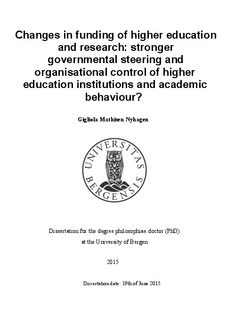| dc.contributor.author | Nyhagen, Gigliola Mathisen | |
| dc.date.accessioned | 2016-11-18T10:34:00Z | |
| dc.date.available | 2016-11-18T10:34:00Z | |
| dc.date.issued | 2015 | |
| dc.identifier.uri | http://hdl.handle.net/11250/2421794 | |
| dc.description.abstract | Funding of higher education and research has experienced substantial changes in the last decades. Although there is variation across European countries, a stronger competitive element increasingly characterises higher education research funding. In spite of the growing political attention to policies, reforms and means related to higher education and research funding, changes and implications remain to be systematically analysed. Thus in this dissertation changes in funding of higher education and research as well as the implications for higher education institutions and academic behaviour is studied systematically across countries, during different periods and across different levels of analysis. The question that is particularly addressed is the extent to which these changes are followed by stronger governmental steering and organisational control of higher education institutions and academic behaviour. The extent to which the implications of changes in funding higher education and research imply that universities move from being specific organisations to more formal organisations is also a question that guides the dissertation.
The dissertation consists of three articles that deal with the different levels and topics described above. The first article compares government funding policies of universities in three European countries (England, France and Norway) from the 1980s to 2010. The article investigates specific reforms in the countries and uses a comparative approach to study the implications of political and administrative characteristics for developing government funding policies of universities. The conclusion in the article suggests that the relationship between political-administrative characteristics and the degree of changes in government funding policies of universities is a complex one. The article show that three different countries belonging to different political administrative systems associated with different expectation did experience substantial change in funding policies of universities. A main finding concerns the lack of explanatory force of political-administrative characteristics which suggests that the classification can be questioned. This is further supported by finding path dependent change mechanisms as more useful for explaining how change can come about by smaller modifications in institutional structure as well as by larger transformations.
The second article analyses the implications of funding policies and funding arrangement for research and research organisation at universities. The article addresses universities’ ability to generate problem choices based on internal scientific criteria compared to external demands. In the article knowledge production is considered both as related to disciplinary autonomy but also existing in a context where research funders require disciplinary borders to be redefined. The case study of a university-based research centres serves as empirical entry point to study these questions. The analysis of the research centre show that different institutional logics influencing researchers’ problem choices were related to different phases. The investigation supports a shift in institutional logics resulting from changed premises in the funding environment and political intervention from central bureaucracy and the university leadership. The new institutional logic did challenge the past logic but findings supports a co-existence of logics rather than replacement.
The third article addresses the implications of funding arrangements for academic work, and studies new organisational structures at universities that are related to financial instruments such as competitive research funding and competitive funding for doctoral education. Empirically this is studied by a case study of a research centre and two case studies of doctoral schools at a Norwegian university. The article addresses the emerging division of work that seems to have been spurred by the increasing differentiation of the academic profession. The article finds some support for changes in academic work however specialisation in terms of functions is less than expected but on the other side a collectivization of academic activities is identified in all the cases. The analysis nevertheless supports a continued decoupling of formal and informal way of organising academic work. Therefore academic work seems to be only partly influenced by new formal arrangements and traditional structures for organising academic activities are characterised by resilience.
A main conclusion in this dissertation confirms that changes in funding of higher education and research in the last decades are related to variation in time and scope. Variation is related to time as changes take place in different periods in the different countries and in scope as changes differ in the degree of comprehensiveness. Another central conclusion is that implications of changes for higher education institutions and academic practice are evident but seems to be less related to intentions behind reform. Findings in this dissertation support the initial claim of stronger governmental steering and organisational control of universities through funding means but also the presence of other forms of academic control. The analyses also show that there is not a convergent movement towards universities as less specific organisations due to changes in funding of higher education and research. | nb_NO |
| dc.language.iso | eng | nb_NO |
| dc.publisher | Universitetet i Bergen | |
| dc.relation.haspart | Paper I: Nyhagen, Gigliola Mathisen (2015), Between Slow and Comprehensive Reformers: Comparing Government’s Funding Policies of Universities in Three European Countries. International Journal of Public Administration 38 (8). The published version is availble at: <a href="http://dx.doi.org/10.1080/01900692.2014.949748" target="blank">http://dx.doi.org/10.1080/01900692.2014.949748</a> | nb_NO |
| dc.relation.haspart | Paper II: Nyhagen, Gigliola Mathisen (2015), Lost in transition? Shifting institutional logics of knowledge production within a research centre of climatology. | nb_NO |
| dc.relation.haspart | Paper III: Nyhagen, Gigliola Mathisen, Baschung, Lukas (2013). New organisational structures and the transformation of academic work. Higher Education 66 (4), pp. 409-423. The published version is available at: <a href="http://dx.doi.org/10.1007/s10734-013-9612-1" target="blank">http://dx.doi.org/10.1007/s10734-013-9612-1</a> | nb_NO |
| dc.title | Changes in funding of higher education and research: stronger governmental steering and organisational control of higher education institutions and academic behaviour? | nb_NO |
| dc.type | Doctoral thesis | nb_NO |
| dc.rights.holder | Copyright the author. All rights reserved. | nb_NO |
| dc.description.degree | Avhandling (Doktorgrad) - Universitetet i Bergen, 2015 | |
